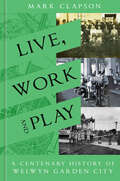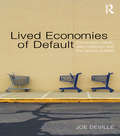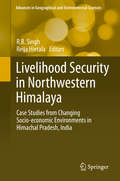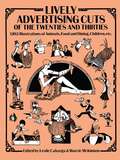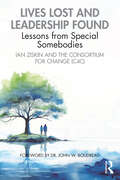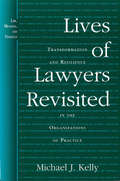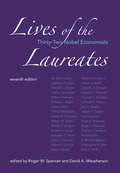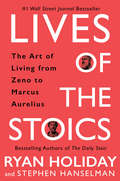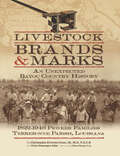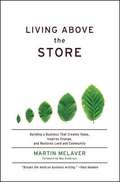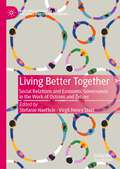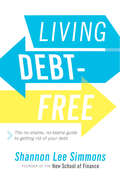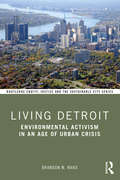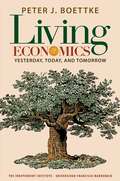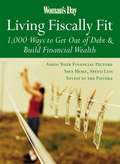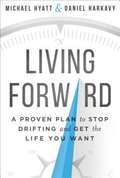- Table View
- List View
Live, Work and Play: A Centenary History of Welwyn Garden City
by Mark ClapsonBooks about history using real life memories recorded specifically for the purpose are rare, Live, Work & Play is just such a book. Created from the hundreds of reminiscences of the residents of the town gathered by the WGC Heritage Trust and put into historical context by Prof Mark Clapson , one of the UK’s leading social historians, the book offers a unique insight into the creation of the UK’s second garden city. Timed to appear at the start of 2020, when Welwyn Garden City achieves its 100th year, the history of Sir Ebenezer Howard’s final masterpiece, with all its imperfections, is laid out for all to read. Now thriving and at ease with itself WGC is an example of how to create homes for its community. Created as a Garden City in 1920, developed as a New Town from 1948 the lessons it offers are invaluable to both developers and governments alike.
Lived Economies of Default: Consumer Credit, Debt Collection and the Capture of Affect (CRESC)
by Joe DevilleConsumer credit borrowing – using credit cards, store cards and personal loans – is an important and routine part of many of our lives. But what happens when these everyday forms of borrowing go ‘bad’, when people start to default on their loans and when they cannot, or will not, repay? It is this poorly understood, controversial, but central part of both the consumer credit industry and the lived experiences of an increasing number of people that this book explores. Drawing on research from the interior of the debt collections industry, as well as debtors' own accounts and historical research into technologies of lending and collection, it examines precisely how this ever more sophisticated, globally connected market functions. It focuses on the highly intimate techniques used to try and recoup defaulting debts from borrowers, as well as on the collection industry’s relationship with lenders. Joe Deville follows a journey of default, from debtors’ borrowing practices, to the intrusion of collections technologies into their homes and everyday lives, to the collections organisation, to attempts by debtors to seek outside help. In the process he shows how to understand this particular market, we need to understand the central role played within it by emotion and affect. By opening up for scrutiny an area of the economy which is often hidden from view, this book makes a major contribution both to understanding the relationship between emotion and calculation in markets and the role of consumer credit in our societies and economies. This book will be of interest to students, teachers and researchers in a range of fields, including sociology, anthropology, cultural studies, economics and social psychology.
Livedoor
by Robin Greenwood Michael SchorThe president of Fuji Television must decide how to respond to a competing bid for the shares of Nippon Broadcasting Systems (NBS). Livedoor, the other bidder, is a highly valued Internet company that has been accused of financial wizardry to keep its stock price high.
Livelihood Enhancement Through Agriculture, Tourism and Health (Advances in Geographical and Environmental Sciences)
by R. B. Singh Narayan Chandra Jana Anju SinghAgriculture is the backbone of our economic system. It provides not only food and raw material but also employment opportunities to a very large number of people. Higher atmospheric temperature has an impact on crop yields while the changes in rainfall could affect both crop quality and quantity. Climate change, therefore, could increase the prices of major crops in some regions. For the most vulnerable people, lower agricultural output means lower income. In addition, climate change is expected to increase the risk of illness and death from extreme heat and poor air quality. Recent evidence is the COVID-19 pandemic. Furthermore, climate change also affects the occurrence of other infectious diseases. A number of well-known diseases are climate-sensitive - malaria, dengue fever, and cholera among others. Tourism is considered as an industry and alternative contributor to a nation’s income. It can generate employment opportunities and boost up the economy. This book, consisting of 26 chapters, focuses on the issues of agriculture, tourism and health for livelihood enhancement. It is essential to discuss these diverse issues in the field of geography as it encompasses interdisciplinary topics. The range of concerns at the national, regional and local levels is not confined to geography only but also involves other disciplines as well. Therefore, this book is a valuable source for scientists and researchers in allied fields such as livelihood, agriculture, land use, tourism management, health care and tribal studies. Furthermore, this book can be of immense help to the researchers, planners and decision makers engaged in solving problems in these areas in developing countries and beyond.
Livelihood Pathways of Indigenous People in Vietnam’s Central Highlands: Exploring Land-Use Change (Advances in Asian Human-Environmental Research)
by Huỳnh Anh Chi TháiThis study focuses on impacts of the environmental and socio-economic transformation on the indigenous people's livelihoods in Vietnam's Central Highlands recent decades since the country's reunification in 1975.The first empirical section sheds light on multiple external conditions (policy reforms, population trends, and market forces) exposed onto local people. The role of human and social capital is examined again in a specific livelihood of community-based tourism to testify the resilience level of local people when coping with constraints. The study concludes with an outlook on implications of development processed which still places agriculture at the primary position livelihood, and pays attention to human capital and social capital of indigenous groups in these highlands.
Livelihood Security in Northwestern Himalaya
by R. B. Singh Reija HietalaThis book identifies and analyzes livelihood impacts of recent environmental and socio-economic changes in urban and rural settings of the mountainous state of Himachal Pradesh, north western Himalaya, India. The findings of the research deal with the broader objectives of the changing patterns of agricultural production with special reference to diversification, as well as forest-based livelihood outcomes, Clean Development Mechanism forest project activities, the roles of different ethnic groups and non-governmental organizations and the benefits and shortcomings of tourism as a livelihood source. These tasks are studied by using an exploratory approach, with participant observation, interviews through random and cluster sampling among villagers, local land users and officials, as well as with land cover interpretation and secondary statistical data. This book is relevant for educational use together with policy input on the issues exploring livelihood security in a rapidly growing developing country.
Lively Advertising Cuts of the Twenties and Thirties: 1,102 Illustrations of Animals, Food and Dining, Children, etc.
by Leslie Cabarga Marcie MckinnonThis comprehensive anthology of graphic cuts -- created by talented artists decades ago -- offers today's professional illustrators and commercial artists a wealth of engaging designs. Suitable for a vast number of advertisements and announcements, for use on greeting cards and menus, as well as for a host of craft projects, these attractive cuts will be indispensable to anyone wanting to add a nostalgic touch to a project or assignment.Painstakingly selected from magazines, newspapers, books, and catalogs of the 1920s and 30s, here are over 1,000 distinctive, boldly outlined drawings and silhouettes. They embrace a wide variety of categories:Food and dining: restaurant scenes, delicatessen counters, shopping baskets filled with food, plates of mouth-watering desserts, waiters and waitressesAmusements: magicians, fortune-tellers, card tricksChildren's activities: fishing, flying kites, reading, running, jumping ropeWomen's fashions: hairstyles, hats, furs, jewelryAnimals: dogs, cats, cows, sheep, chickens... and much, much more.Casual browsers will be delighted with the volume's engaging visual commentary on early twentieth-century American life. Artists and illustrators looking for royalty-free graphics filled with period charm will find them in this extensive collection.
Liverpool Miss
by Helen ForresterHelen Forrester grew up poor, as the eldest of seven children, there was never enough to eat. But her severe malnutrition wasn't her only challenge, her parents' wanted her to stay home and mind her siblings, instead of getting a job and earning her keep.
Lives Lost and Leadership Found: Lessons from Special Somebodies
by Ian ZiskinLives Lost and Leadership Found: Lessons from Special Somebodies explores leadership and transformational change through the lens of personal stories. This unique book gathers insights from dozens of contributing authors who reflect on the profound impact of losing "special somebodies" who helped shape their lives and careers. While emotional, the focus is on growth, leadership, and learning through love and loss rather than grief.Featuring heartfelt narratives, survey input from 150 leaders, and an exploration of the neuroscience of grieving, this book offers valuable perspectives on resilience, growth, and leadership.Lives Lost and Leadership Found is a must-read for leaders who seek inspiration and insight from life’s most challenging moments, offering valuable lessons on how personal experiences of loss can unlock transformative leadership growth.
Lives in Peril
by Nick Bailey David WaltersLives in Peril demonstrates how and why seafarers are a vulnerable group of workers. It argues they are made so by the organisation and structure of their employment; the prioritisation of profit over safety by the actors that engage and control their labour; the limits of enforcement of the regulatory framework that is in place to protect them; and by their weakness as collective actors in relation to capital. The consequences of this vulnerability are seen in data on their occupationally-related morbidity and mortality - evidence that probably only represents a partial picture of the actual extent of the physical, mental and emotional harm resulting from work at sea. This volume's central argument is that this situation is likely to remain broadly unchanged as long as global maritime governance and regulation remains in thrall to the neo-liberal economic and political arguments that drive globalisation, and fails to enforce regulatory standards more robustly.
Lives of Lawyers Revisited: Transformation and Resilience in the Organizations of Practice
by Michael J. KellyThe past two decades have seen profound changes in the legal profession. Lives of Lawyers Revisited extends Michael Kelly's work in the original Lives of Lawyers,offering unique insights into the nature of these changes, examined through stories of five extraordinarily varied law practices. By placing the spotlight on organizations as phenomena that generate their own logic and tensions,Lives of Lawyers Revisited speaks to the experience of many lawyers and anticipates important issues on the professional horizon. "Michael Kelly has done it again! His Lives of Lawyers Revisited is a very easy read about some very difficult notions like 'litigation blindness' and law as a business. It presents some fascinating perspectives on our profession." --J. Michael McWilliams, Past President, American Bar Association. "The best single book about the American realities and possibilities of the American legal profession, combining an empathic and insightful account of law practice with a penetrating analysis of the wider context of professional work." --Marc Galanter, University of Wisconsin. "Michael Kelly believes that professional values and conduct are not realized in codes, but in the experiences of practice, and that practice draws its routines and ideals from organizations. Through his studies of lawyers in various firms, closely observed and sympathetically described, Kelly reveals how differently organizations adapt to the intense pressures of today's practice environment. His method of linking individual life-experiences to organizational strategies and the external constraints of competition and client demands infuses realism and richness into the concept of professionalism and makes this one of the most interesting and original books on professions and professionalism to appear in years." --Robert W. Gordon, Yale Law School. "In his two volumes of Lives of Lawyers, Michael Kelly explores legal ethics in an unusual, and unusually rewarding, way. Rather than focusing on rules or arguments, Kelly looks at the kind of lives lawyers lead. Ethics, Socrates thought, is about how to live one's life, and Kelly takes the Socratic question to heart. He explores the institutions lawyers work in and the choices they make. He writes with intelligence, great insight, and above all with heart. This is a superb book." --David Luban, Georgetown University. Michael J. Kelly is President and Chairman of the Board of the National Senior Citizens Law Center, an advocacy group for older Americans of limited means.
Lives of the Laureates, seventh edition: Thirty-Two Nobel Economists
by David Macpherson Roger SpencerAutobiographical accounts by Nobel laureates reflect the richness and diversity of contemporary economic thought and offer insights into the creative process; with six new laureates.Lives of the Laureates offers readers an informal history of modern economic thought as told through autobiographical essays by thirty-two Nobel Prize laureates in economics. The essays not only provide unique insights into major economic ideas of our time but also shed light on the processes of intellectual discovery and creativity. The accounts are accessible and engaging, achieving clarity without sacrificing inherently difficult content. This seventh edition adds six Nobelists to its pages: Roger B. Myerson (co-recipient in 2007) describes his evolution as a game theorist and his application of game theory to issues that ranged from electoral systems to perverse incentives; Thomas J. Sargent (co-recipient in 2011), recounts the development of the rational expectations model, which fundamentally changed the policy implications for macroeconomic models; Amartya Sen (recipient in 1998) reflects on his use of a bicycle (later donated to the Nobel Museum) to collect data early in his career; A. Michael Spence (co-recipient in 2001) describes, among other things, his whiplash-inducing first foray into teaching an undergraduate class; Christopher A. Sims (co-recipient in 2011) discusses his “non-Nobel” research; and Alvin E. Roth (co-recipient in 2012) chronicles the “three insurrections” he has witnessed in mainstream economics.Lives of the Laureates grows out of a continuing lecture series at Trinity University in San Antonio, which invites Nobelists from American universities to describe their evolution as economists in personal as well as technical terms.The LaureatesW. Arthur Lewis, Lawrence R. Klein, Kenneth J. Arrow, Paul A. Samuelson, Milton Friedman, George J. Stigler, James Tobin, Franco Modigliani, James M. Buchanan, Robert M. Solow, William F. Sharpe, Ronald H. Coase, Douglass C. North, John C. Harsanyi, Myron S. Scholes, Gary S. Becker, Robert E. Lucas, Jr., Vernon L. Smith, Clive W. J. Granger, Edward C. Prescott, Thomas C. Schelling, Edmund S. Phelps, Eric S. Maskin, Joseph E. Stiglitz, Paul Krugman, Peter A. Diamond, Roger B. Myerson, Thomas J. Sargent, Amartya Sen, A. Michael Spence, Christopher A. Sims, Alvin E. Roth
Lives of the Stoics: The Art of Living from Zeno to Marcus Aurelius
by Ryan Holiday Stephen HanselmanFrom the bestselling authors of The Daily Stoic comes an inspiring guide to the lives of the Stoics, and what the ancients can teach us about happiness, success, resilience and virtue.Nearly 2,300 years after a ruined merchant named Zeno first established a school on the Stoa Poikile of Athens, Stoicism has found a new audience among those who seek greatness, from athletes to politicians and everyone in between. It's no wonder; the philosophy and its embrace of self-mastery, virtue, and indifference to that which we cannot control is as urgent today as it was in the chaos of the Roman Empire. In Lives of the Stoics, Holiday and Hanselman present the fascinating lives of the men and women who strove to live by the timeless Stoic virtues of Courage. Justice. Temperance. Wisdom. Organized in digestible, mini-biographies of all the well-known--and not so well-known--Stoics, this book vividly brings home what Stoicism was like for the people who loved it and lived it, dusting off powerful lessons to be learned from their struggles and successes. More than a mere history book, every example in these pages, from Epictetus to Marcus Aurelius--slaves to emperors--is designed to help the reader apply philosophy in their own lives. Holiday and Hanselman unveil the core values and ideas that unite figures from Seneca to Cato to Cicero across the centuries. Among them are the idea that self-rule is the greatest empire, that character is fate; how Stoics benefit from preparing not only for success, but failure; and learn to love, not merely accept, the hand they are dealt in life. A treasure of valuable insights and stories, this book can be visited again and again by any reader in search of inspiration from the past.
Livestock Brands and Marks: An Unexpected Bayou Country History: 1822–1946 Pioneer Families: Terrebonne Parish, Louisiana
by Christopher Everette Cenac Sr.A 2014 Humanities Book of the YearResearching the original brand registration of his great-grandfather Pierre Cenac for his book Eyes of an Eagle, Dr. Christopher Everette Cenac Sr. discovered a serendipitous trove of local history in the form of long-forgotten volumes in the Terrebonne Parish Courthouse in Houma, Louisiana. The three ledger books that emerged through the efforts of the local Clerk of Court became, in themselves, a series of capsulized glimpses into the citizenry of the area's early agrarian foundations. In extraordinary condition, these ledgers held an unprecedented set of the original livestock brands and marks of bustling bayou cattle country.Each registration entry furnished a record of the progression of settlement of the parish. The registration of a brand often served as the family's calling card upon making Terrebonne Parish their home. Livestock Brands and Marks: An Unexpected Bayou Country History: 1822-1946 Pioneer Families: Terrebonne Parish, Louisiana is designed not only to share the actual registration treasures of all 1140 brands in the brand books themselves, but also to chronicle a short history of laws governing animal identification, to document advances in forms of ownership identification, and to familiarize the reader with both ancient and more recent livestock breeds that received brands and other marks recorded in those three ledger books. Three hundred black-and-white and color illustrations illuminate this fascinating history.
Living Above the Store
by Martin MelaverThe economic crash of late 2008 is just the latest evidence of the truth that many have known: that too much of our modern economy is based on a house of cards. We need businesses that not only factor their impact on people and places into their equations for success but also strive to restore the communities and environments in which they operate. Martin Melaver provides a roadmap for creating such a business. It's not only a "how to" but a "why to" that challenges business as usual to change. "Living Above the Store" brings us into the story of Melaver, Inc. , a third-generation, 70-year-old family real estate business, as it evolves toward becoming a thought and product leader in sustainable business practices. It is part business management theory and part case study, where sustainable principles meet sustainable practices, always grounded in day-to-day practice. "Living Above the Store" demonstrates how to: adopt a business model that provides for economic success while contributing to society and the environment; shape a business culture that is restorative to a workforce by helping employees realize their highest potential; leverage an ethos within a business that "ripples outward" to foster restoration of both land and community; embrace a notion of limits to growth; and reframe ideas about competition, proprietary knowledge, and business success "Living Above the Store" is for readers who care about issues of community and sustainability.
Living Better Together: Social Relations and Economic Governance in the Work of Ostrom and Zelizer (Mercatus Studies in Political and Social Economy)
by Virgil Henry Storr Stefanie HaeffeleElinor C. Ostrom, a Nobel prize winning political economist, made important contributions to common pool resources, economic governance, and polycentricity. Viviana A. Zelizer, a prominent economic sociologist, has done groundbreaking work on how culture shapes our economic lives. Together, the work of Ostrom and Zelizer spans the disciplines of economics, sociology, political science, and public policy by exploring the social relations and community-based organization of everyday life. Both scholars examine the norms, social connections, and cultural impacts of exchange and governance. This volume explores their contributions and builds off of their research programs to explore the social movements, community recovery, and war, and women’s issues across a variety of disciplines, including economics, political science, sociology, history, and archaeology. Inspired by Zelizer’s 2019 Ostrom Speaker Series lecture for the F. A. Hayek Program for Advanced Study in Philosophy, Politics, and Economics at the Mercatus Center at George Mason University, this volume explores the connections between the work of Elinor Ostrom and Viviana Zelizer. Beginning with a lead chapter by Zelizer where she reflects on the connections between her work and Ostrom’s oeuvre, the volume brings together scholars who tease out some of the important concepts and implications of Ostrom and Zelizer’s research. This volume furthers economic inquiry by ensuring that the critical examinations of these timely and important themes are made available to students and scholars.
Living Beyond "What If?": Release the Limits and Realize Your Dreams
by Shirley DavisFree yourself from self-limiting beliefs and fears that keep you stuck. This book lays out a blueprint for how to take control of your life and begin living your dreams.We all dream. We all imagine. And we all want to live our best life. But why is it that 90 percent of people admit that if they got to live their life over, they would live it differently? What keeps us comfortable with the status quo and unable to get beyond &“What if&”? In part 1 of this book, Dr. Shirley Davis addresses these and other questions by guiding the reader through a personal journey of self-discovery, a search for significance, and an examination of the self-imposed limitations that can hijack our purpose, power, and possibilities.In part 2, she details the readers' journies toward realizing their dreams by reimagining their lives, identifying their &“why,&” and developing a life plan to stay focused and accountable. She describes the right questions to ask, the right mindset to adopt, and the right relationships to build that will enable everyone to live the life he or she has always imagined.Dr. Davis reveals the necessary steps for releasing the limits we place on ourselves as a result of life's tests, wrong thinking, and bad decisions. She helps readers overcome paralyzing fears that keep dreams on pause and inspires the confidence to jump first and grow wings on the way down.
Living Construction (Bio Design)
by Martyn Dade-RobertsonModern biotechnologies give us unprecedented control of the fundamental building blocks of life. For designers, across a range of disciplines, emerging fields such as synthetic biology offer the promise of new sustainable materials and structures which may be grown, are self-assembling, are self-healing and adaptable to change. While there is a thriving speculative discourse on the future of design in the age of biotechnology, there are few realized design applications. This book, the first in the Bio Design series, acts as a bridge between design speculation and scientific reality and between contemporary design thinking, in areas such as architecture, product design and fashion design, and the traditional engineering approaches which currently dominate bio technologies. Filled with real examples, Living Construction reveals how living cells construct and transform materials through methods of fabrication and assembly at multiple scales and how designers can utilize these processes.
Living Debt-Free: The No-Shame, No-Blame Guide to Getting Rid of Your Debt
by Shannon Lee SimmonsGet rid of your debt without giving up your lifeNo one wants to be in debt. But life happens and if you’ve got debt, life has happened to you. Whether you have a rolling balance of $2,000 on your credit card or an $80,000 line of credit you are positive you will carry to your grave, debt can be a huge cause of stress—affecting both your emotional and financial wellness. After working with thousands of financial planning clients, Shannon Lee Simmons knows that your only way out of the debt cycle is to truly understand all of your spending triggers so you can shut them down for good. In Living Debt-Free, she shows you that it is possible to have a life and pay down debt at the same time. In fact, that’s the only way your debt plan will work. You will learn to take control of your finances and pay down your debt in a realistic way that will keep you motivated long enough to see it through to the end. No shame. No blame. No scare tactics.In Living Debt-Free, Simmons focuses on creating a debt repayment plan that will motivate you for a long time, rather than an unrealistic one that’s strictly about paying the least amount of interest charges. (Collective gasp—how dare she!?) Listen, everyone knows that paying interest on debt is bad and to be avoided as much as possible, but human beings are complex. Life is complex. Debt is complex. There cannot be a one-size-fits-all plan, so Living Debt-Free will help you build your plan—the one that will help you finally put the debt behind you, start fresh and feel good about your money again.
Living Detroit: Environmental Activism in an Age of Urban Crisis (Routledge Equity, Justice and the Sustainable City series)
by Brandon M. WardIn Living Detroit, Brandon M. Ward argues that environmentalism in postwar Detroit responded to anxieties over the urban crisis, deindustrialization, and the fate of the city. Tying the diverse stories of environmental activism and politics together is the shared assumption environmental activism could improve their quality of life. Detroit, Michigan, was once the capital of industrial prosperity and the beacon of the American Dream. It has since endured decades of deindustrialization, population loss, and physical decay – in short, it has become the poster child for the urban crisis. This is not a place in which one would expect to discover a history of vibrant expressions of environmentalism; however, in the post-World War II era, while suburban, middle-class homeowners organized into a potent force to protect the natural settings of their communities, in the working-class industrial cities and in the inner city, Detroiters were equally driven by the impulse to conserve their neighborhoods and create a more livable city, pushing back against the forces of deindustrialization and urban crisis. Living Detroit juxtaposes two vibrant and growing fields of American history which often talk past each other: environmentalism and the urban crisis. By putting the two subjects into conversation, we gain a richer understanding of the development of environmental activism and politics after World War II and its relationship to the crisis of America’s cities. This book will be of great interest to students and scholars in environmental, urban, and labor history.
Living Economics: Yesterday, Today, and Tomorrow
by Peter J. BoettkeEconomics is not merely a game to be played by clever professionals, but a discipline that touches upon the most pressing practical issues at any historical juncture. The wealth and poverty of nations is at stake; the length and quality of life turns on the economic conditions individuals find themselves living within. Touching upon a variety of subjects—including market socialism, political economy, and economics education—this reference contains the wisdom of an expert in the field, Peter J. Boettke.The passion of the teacher is often the inspiration for a student. Living Economics illuminates how economics affects all walks of life, whether in the marketplace, voting booth, church, family, or any human activity. Boettke believes that economics is not merely a game to be played by clever professionals, but a discipline that touches on the most pressing practical issues at any historical juncture. The wealth and poverty of nations are at stake; the length and quality of life turns on the economic conditions individuals find themselves living with. So teaching and learning economics are high stakes ventures. Along the way he introduces us to major thinkers: from the Late Scholastics in 16th- and 17th-century Spain to Smith, Say, and Bastiat of the Classical School, to Austrian School scholars (Menger, Mises, Hayek, Kirzner, and Rothbard) on to New Institutional economists (Alchian, Coase, Demsetz, North, Ostrom and Williamson) and Public Choice theorists (Buchanan, Tullock, and others). This engaging and reasoned book is a must-read for economists, students, and everyone else who wishes to better understand economics. A great supplemental text for the teaching of economics, this book offers a clear perspective and a passion for a deeper understanding of the subject.
Living Fiscally Fit: 1000 Ways to Get Out of Debt and Build Financial Wealth
by The Editors of Woman's DayFull of practical and engaging advice, Living Fiscally Fit is a financial planning guide that dispenses invaluable advice to today's busy woman.
Living Forward: A Proven Plan to Stop Drifting and Get the Life You Want
by Michael Hyatt Daniel HarkavyEach of us has but one life to live on this earth. What we do with it is our choice. Are we drifting through it as spectators, reacting to our circumstances when necessary and wondering just how we got to this point anyway? Or are we directing it, maximizing the joy and potential of every day, living with a purpose or mission in mind? Too many of us are doing the former--and our lives are slipping away one day at a time. But what if we treated life like the gift that it is? What if we lived each day as though it were part of a bigger picture, a plan? That's what New York Times bestselling author Michael Hyatt and executive coach Daniel Harkavy show us how to do: to design a life with the end in mind, determining in advance the outcomes we desire and path to get there. In this step-by-step guide, they share proven principles that help readers create a simple but effective life plan so that they can get from where they are now to where they really want to be--in every area of life.
Living Hungry In America
by J. A. C. Brown H. F. PizerWritten toward the layperson, this is a recounting of a 2 year national study of hunger in America. The authors, plus multiple field teams, traveled America looking at the growing number of hungry people, their changing demographics and the causes of that hunger. The book includes an extensive index, useful for research purposes.
